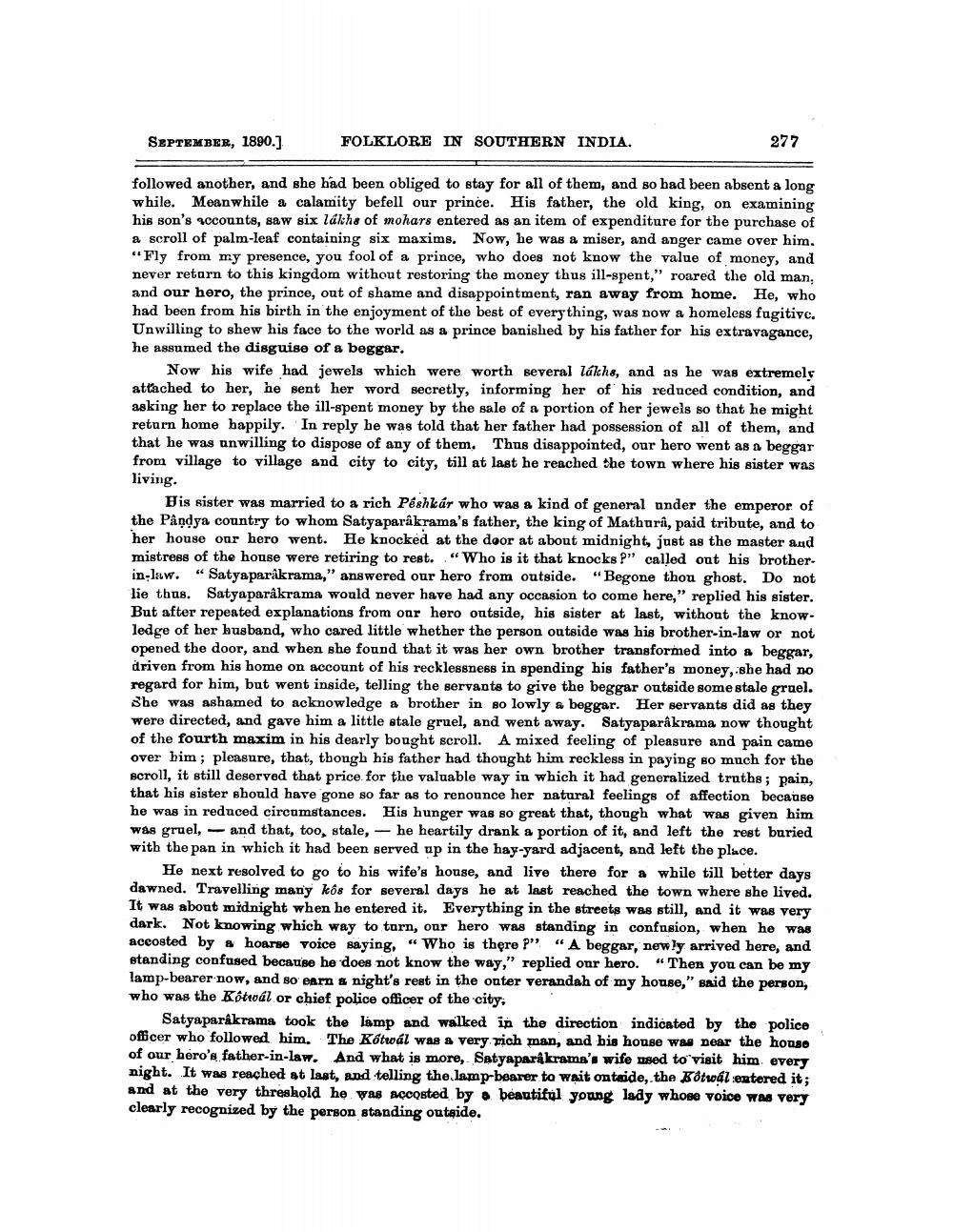________________
SEPTEMBER, 1890.)
FOLKLORE IN SOUTHERN INDIA.
277
followed another, and she had been obliged to stay for all of them, and so had been absent a long while. Meanwhile a calamity befell our prince. His father, the old king, on examining his son's accounts, saw six lakhs of mohars entered as an item of expenditure for the purchase of a scroll of palm-leaf containing six maxims. Now, he was a miser, and anger came over him. "Fly from my presence, you fool of a prince, who does not know the value of money, and never return to this kingdom without restoring the money thus ill-spent," roared the old man, and our hero, the prince, out of shame and disappointment, ran away from home. He, who had been from his birth in the enjoyment of the best of everything, was now a homeless fugitive. Unwilling to shew his face to the world as a prince banished by his father for his extravagance, he assumed the disguise of a beggar.
Now his wife had jewels which were worth several lákhs, and as he was extremely attached to her, he sent her word secretly, informing her of his reduced condition, and asking her to replace the ill-spent money by the sale of a portion of her jeweis so that he might return home happily. In reply be was told that her father had possession of all of them, and that he was anwilling to dispose of any of them. Thus disappointed, our hero went as a beggar from village to village and city to city, till at last he reached the town where his sister was living.
Vis sister was married to a rich Peshkár who was a kind of general under the emperor of the Pândya country to whom Satyaparakrama's father, the king of Mathura, paid tribute, and to her house our hero went. He knocked at the door at about midnight, just as the master and mistress of the house were retiring to rest. “Who is it that knocks P" called out his brotherin-law. “Satyaparâkrama," answered our hero from outside. "Begone thou ghost. Do not lie thus. Satyaparakrama would never have had any occasion to come here," replied his sister. But after repeated explanations from our hero outside, his sister at last, without the knowledge of her husband, who cared little whether the person outside was his brother-in-law or not opened the door, and when she found that it was her own brother transformed into a beggar, driven from his home on account of his recklessness in spending his father's money, she had no regard for him, but went inside, telling the servants to give the beggar outside some stale gruel. She was ashamed to acknowledge a brother in so lowly & beggar. Her servants did as they were directed, and gave him a little stale gruel, and went away. Satyaparakrama now thought of the fourth maxim in his dearly bought scroll. A mixed feeling of pleasure and pain came over him; pleasure, that, thongh his father had thonght him reckless in paying so much for the scroll, it still deserved that price for the valuable way in which it had generalized truths; pain, that his sister should have gone so far as to renonnce her natural feelings of affection because he was in reduced circumstances. His hunger was so great that, though what was given him was gruel, and that, too, stale, - he heartily drank a portion of it, and left the rest buried with the pan in which it had been served up in the hay-yard adjacent, and left the place.
He next resolved to go to his wife's house, and live there for a while till better days dawned. Travelling many kôs for several days he at last reached the town where she lived. It was about midnight when he entered it. Everything in the streets was still, and it was very dark. Not knowing which way to torn, our hero was standing in confusion, when he was accosted by & hoarse voice saying, “Who is there ?" "A beggar, newly arrived here, and standing confused because he does not know the way," replied onr hero. "Then you can be my lamp-bearer now, and so earn a night's rest in the outer verandah of my house," said the person, who was the Kotroál or chief police officer of the city,
Satyaparakrama took the lamp and walked in the direction indicated by the police oficer who followed him. The Kátrál was a very rich man, and bis house was near the house of our hero's father-in-law. And what is more, Satyaparakrama's wife used to visit him every night. It was reached at last, and telling the lamp-bearer to wait ontaide, the Kotwal entered it; and at the very threshold he was accosted by beautiful young lady whose voice was very clearly recognized by the person standing outside.




